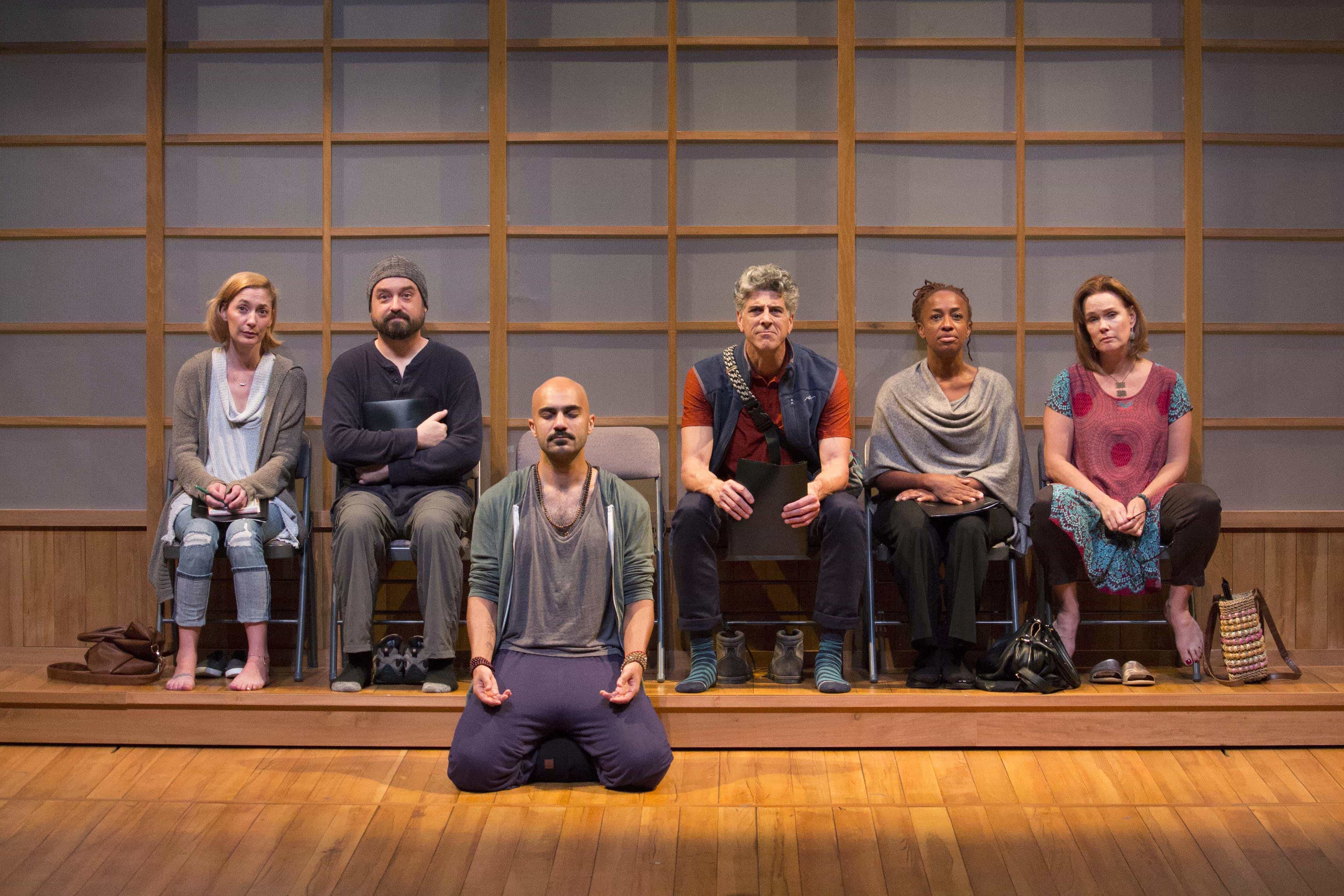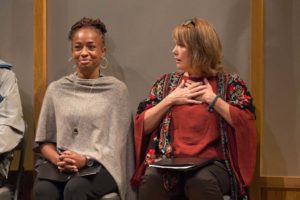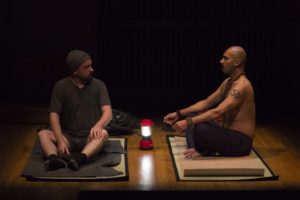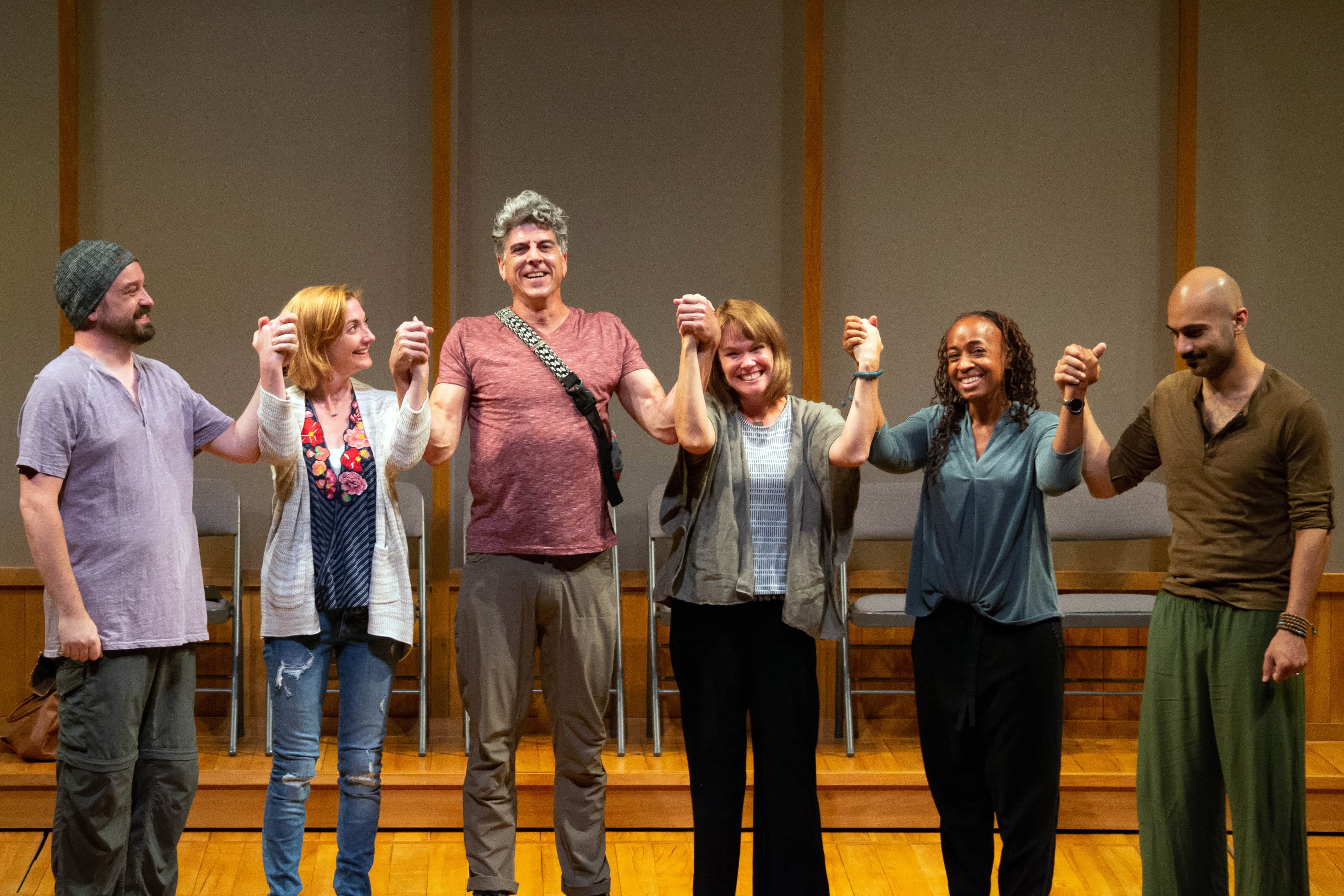“You have everything you need within you to be human,” says an unseen guru on the god mic. He is speaking in sonorous tones to six seekers who now sit rapt in a row facing us the audience. They have come to a weeklong silent retreat by the shore of a sylvan lake. We have come to the theater to watch and participate in their process. In one sense the experience of the retreat is theirs. In another, it is ours, because there really is a lot of silence in this play.
Small Mouth Sounds by Bess Wohl is one of those wily comedies where what’s funny is what you will. There are some laughs that are large but lots more that are small, like individual little fishes leaping up out of the water.
That could happen in the very lake we see rippling through upstage slats in Debra Booth’s calming blond-wood set and Alexandra Kelly Colburn’s you-are-there projections, where birds can be seen swooping through the air.

What’s going on in Small Mouth Sounds is that the headspace the play creates for its characters—self-reflective, meditative, contemplative—is also a headspace it sets up for us. Where it wants to take the characters, it kind of wants to take us too. Meanwhile, all that dialog-free time on one’s mind can lead one to wonder about that disembodied guru guy. He keeps saying stuff about mindfulness, self-awareness, personal change, his head cold. Is he a for-real wise master or a spoof of our self-absorption?
That Teacher, exquisitely voiced by Timothy Douglas, perfectly pitches us together with the six retreaters into the same fishy kettle of bemused uncertainty.

Those seekers, each performed with the precision of a fine mime, are identified in the program by names that are rarely or never spoken in the play: Jan (James Whalen) is a taciturn dude who does a funny bit swatting bugs; Rodney (Maboud Ebrahimzadeh) is a self-help video personality who’s already well versed in retreat-iquete; Ned (Michael Glenn) is a woebegone underdog who gets a full-on monolog, a hilarious recounting of his Job-like travails; Joan and Judy (Andrea Harris Smith and Beth Hylton) are a lesbian couple who are working something out but we’re never told exactly what; and Alicia (Katie deBuys), kind of a ditz, attends to the proceedings with wide-eyed sincerity…and couples offstage very audibly with Rodney.

Costume Designer Debra Kim Sivigny gives each casual clothing they have believably lived in (though Rodney gets a nude scene wearing what he was born in), and Props Master Kasey Hendricks finds them credible accouterments for sleepovers in the woods. Lighting Designer York Kennedy effectively cycles sunshine and moonshine onto a bare wood stage. And Sound Designer Roc Lee’s crickets, birds, and roaring bear also take us into the great outdoors.
Watching the characters’ nonverbal communications and miscommunications is a delight. It’s much more subtle than charades, but the stumbling improv is just as fun. At one point, for instance, Joan breaks into sobs at something Teacher says, and the others keep trying to pass her a packet of sympathy tissues, which she keeps refusing, so as to savor her sorrow.
This retreat is “a vacation from your habits,” pronounces the Teacher. “You will never go back to who you were.” But who was that?

Wohl’s script provides the actors with detailed backstories about their characters, but we the audience are never privy to this information. We never know why each of the six has come here, what need they wanted to be fulfilled, what change they hoped would happen. In the beginning, Teacher instructs them to write their “intentions” on a slip of paper, then at the end to burn them. But whatever was written is known only to them. While this makes for some very entertaining face and body expression, it means there aren’t character arcs to hold on to as in plays with lots more words, and whatever change they undergo remains for us guesswork.
Still (pun intended), Small Mouth Sounds is a rare theatrical experience that not only invites us to think our own thoughts along with the characters but leaves us quiet time to do so. And whether we experience such shared quietude as transcendent or a send-up, this semiserious comedy generously leaves up to us.
Running Time: One hour 20 minutes, with no intermission.
Small Mouth Sounds plays through September 23, 2018, at Round House Theatre – 4545 East-West Highway, in Bethesda, MD. For tickets, call the box office at 240-644-1100, or purchase them online.




